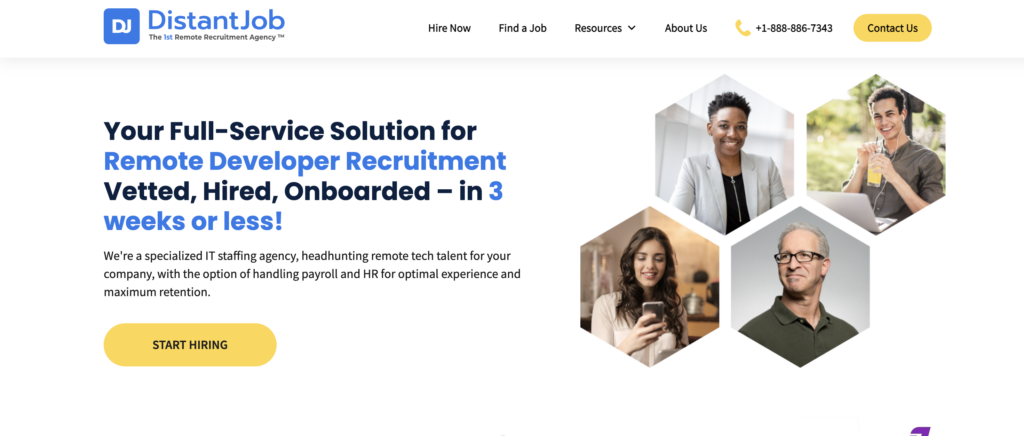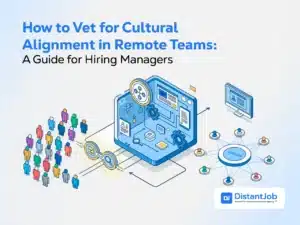Finding and hiring a developer for a startup isn’t about finding a candidate with the right technical skills on paper. It’s about understanding your startup’s needs in depth at that stage and hiring accordingly. Focus on finding developers who understand MVP development, product scalability, and startup culture rather than just technical skills.
This article will provide you with a step-by-step guide on how to find developers as a startup, how to hire them, what to offer them, and what benefits they can bring to your company.
What Type of Developer Do Startups Need?
Startups need versatile developers who understand the complete product lifecycle, from building MVPs to scaling applications. Unlike enterprise roles, startup developers must handle multiple responsibilities including development, testing, deployment, and integration.
Key Qualities to Look For
- Technical versatility: Developers who can work across the full stack and adapt to changing requirements.
- Product mindset: Understanding of user needs, market validation, and iterative development processes.
- Startup experience: Previous work in early-stage companies or fast-paced environments.
- Growth mentality: Willingness to learn new technologies and take on expanding responsibilities.
How to Compete Against Big Tech Salaries
Startups typically pay 16% less than established companies but can attract talent through equity, growth opportunities, and meaningful work.
However, a startup can offset these weaknesses with two aces within their sleeves: impact and equity. Impact means what your startup has to offer to the world with its products and to your candidates as a job position. Equity provides stock options or grants, aligning the engineer’s financial interests with the company’s long-term success. High risk, high reward!
1. Learn about the types of contracts
Before starting hiring, you must consider a few things. First of all, which kind of contract benefits you the most?
| Hiring Type | Pros | Cons |
| Full-Time | Hire will be integrated in your team and culture Bigger dedication and continuity on projects Builds long-term know-how (essential for startups) | Higher cost (salary + benefits) Requires a steady workload to utilize fully Less flexibility in scaling down quickly |
| Part-Time | Lower cost (part-time hours) Access talent who can’t commit full-time (e.g., students, parents) Some integration into team culture | Slower progress May have other jobs/commitments, reducing focus Lesser availability for urgent needs |
| Freelance | On-demand (hire per project) Typically lower cost for short engagements Access to a wide talent pool globally (via platforms) | Quality varies; not guaranteed Less accountability/loyalty to your startup Requires time to screen and manage remotely Legal Ambiguity (they may be considered either a contracted part or as an employee) |
| Contract-Based | Specialized skills for a period (solve immediate needs) Quick to scale a team for projects, then roll off No long-term benefit costs if short-term | Higher hourly rates are common Might not commit beyond contract duration Needs onboarding each time for the company context |
In practice, you might mix these models. For example, you might have a full-time core team, but bring on a freelancer for a specific feature, or use a contractor to kickstart development before you’re ready to hire employees.
Consider the scope and duration of your startup’s needs. Full-time and part-time hires suit ongoing tasks and team building, while freelance/contract hires are better for short-term projects or highly specialized work.
2. Choose between Remote vs Local Hiring
Distance is something you must consider. Start-ups often prioritize remote hiring to tap into a larger talent pool and reduce costs. However, local hiring has its advantages in certain scenarios. Here’s how they compare:
| Distance | Pros | Cons |
| Remote | Global talent pool Reduced costs Better quality | Requires Asynchronous Communication Lack of physical oversight (you must focus on results) |
| Local | Face-to-face meetingsEasier bonding | It shrinks the talent pool 80% of developers prefer to work remotely Higher costs (Real Estate) Lesser quality |
Remote is the best. Forbes acknowledges remote work as a must-use competitive strategy for startups. Consider building a remote-first culture for your workplace.
Nothing stops you from building a local founding team and letting the developers go remote. Going remote-first doesn’t mean you can’t have a shiny office to meet your customers. It means to accommodate your remote employees and extract the best benefit from them.
3. Balance Budget vs Salary
Balancing the budget and salaries is usually one of the biggest constraints for start-ups. According to ZipRecruiter, the average cost of a software engineer per year is $147,524. It’s about $71 per hour!
In comparison, according to PayScale, the average salary of the same software engineer in a startup drops to $101,512.
Hiring developers requires being realistic about salaries and compensation. Therefore, if you want to attract a developer, you must reward them accordingly. They are pretty much aware that they can be picky.
If you don’t have the budget, you can offer them something else, like equity and sharing profits.
Don’t forget to offer work-life balance, which goes hand in hand with remote work. If you own an office, make sure the place is nice and comfy. Finally, it helps if you already have a skilled developer team; your candidate will likely consider working with them.
Just remember: there is no quick fix for this. You are not selling your project just to investors and customers: you are selling it to your future employees.
4. Searching for Candidates
Now that you have prepared the terrain for your hiring process, it’s time to search for candidates.
If you’re considering the DIY approach, then there are multiple strategies you can consider.
Here are the top 7 places to find and hire developers for your company, from freelancers to remote full-time employees. Each one has its pros and cons:
a. Toptal – Exclusive Network of Vetted Freelancers
If you have an upcoming important IT project that you want to be handled diligently, then look no further than Toptal freelancers. They boast a vast network of freelance software developers, designers, and product managers, among other professionals you need.
At Toptal, the focus is on providing a competitive and transparent hiring process, enabling you to acquire the talent your company requires quickly. Their top freelance developers are all carefully assessed in line with industry experience, skills, and availability—you can rest assured you’ll get the right developer for the role you advertised for.
Main cons of freelancing platforms? Although there are a lot of offers, getting real talent is hard. You may see a freelancer offering cheap rates; that could be because they are trying to gather reviews to prove their worth, or they may not be great at what they do.
Freelancers can’t focus 100% on their project because a) they run their businesses and may be involved in or looking for other projects, and b) they are not fully integrated into the culture of your company.
b. Arc
Arc allows you to find and hire developers globally who match your ideal specifications. This AI-powered platform may help in screening the available candidates and matching them to your business’s technical requirements.
They manage the technical assessments, ensuring you get some hires from a global pool of more than 300,000 developers. If you’re looking to upgrade and scale your globally remote developer team while reducing costs and saving time, Arc provides a solution.
Cons: Arc focuses on an AI-powered platform, lacking a human touch, and prone to AI mistakes. While AI is a wonderful tool, it can’t substitute humans.
c. Dice – Your Gateway to Project-based or Freelance Developers
Hiring the right developer for your startup can be tough, and Dice provides the ideal employer solutions to simplify the entire process.
With a large database of 5.1 million resources and a special focus on Tech experts, Dice steps up time-to-hire your next project-based developer, ensuring you get the best fit for your needs.
Cons: Dice’s database may have a regional bias, so finding candidates from different locations might be more challenging.
d. Job Boards like LinkedIn
Organizations and even recruiters use job boards when they are looking for candidates. Listing for your roles means you need to handle all the applications, though.
Main cons of job boards? Too many candidates give you a lot of admin and the job of creating a shortlist. Unfortunately, there is no vetting, meaning you will have to verify each candidate yourself.
e. Stack Overflow
Stack Overflow stands as a premier online hub for developers, renowned for its vibrant community where tech professionals and industry leaders converge to exchange knowledge and insights. Echoing the functionalities of platforms like LinkedIn, Stack Overflow also features a job board.
This platform enables employers to advertise positions and recruit skilled developers, fostering a dynamic space for both learning and professional opportunities in the tech world.
Cons: While Stack Overflow provides technical expertise, evaluating practical skills for a startup role may still require additional assessments and consideration of competition for popular contributors.
f. GitHub
GitHub stands out as a prime destination for startups looking to hire developers due to its numerous advantages. As a platform with millions of users, GitHub hosts a diverse and vast community of developers, covering a wide array of fields and expertise levels. This makes it an ideal place for startups to scout for talent with the required skills and experience. The platform also serves as a showcase for developers to display their projects and contributions, providing a clear picture of their technical abilities and work history.
Remember, when reaching out, try to be respectful and personalized, valuing the developer’s contributions and aligning with their interests.
Cons: GitHub profiles often lack comprehensive professional information, requiring additional validation of skills and experience. Popular developers may receive numerous recruitment inquiries, making it challenging to stand out.
g. DistantJob – Remote Recruiting & EOR Services

DistantJob is a remote IT recruitment agency dedicated to helping companies of all sizes find senior software engineers that align with your needs.
We headhunt globally to find the best full-time remote developers that match your company’s core values and culture. Our comprehensive HR solution covers all legal, payroll, and administrative tasks, making it a hassle-free experience. Working with us for your next recruitment means achieving high-quality results at an affordable rate. No hidden fees, no fine print.
Main cons of remote recruitment agencies? As the name suggests, we only specialize in remote talent. If you’re looking for people to attend the office, this isn’t the solution for you.
5. Interviewing Your Candidates
Once you have a list of potential candidates, you can start to talk to them.
I would like to recommend that you interview your candidate before sending any take-home assessment or live coding challenge. Tech candidates don’t like being tested, so you must build rapport from the start. According to the 2023 Stock Overflow Survey, 78% of developers consider tests a major factor in their decision to accept a job.
If you need to know how to interview your candidates in a structured process, check our article. If you need examples on how to interview professionals, check the following examples:
- WordPress Developer
- Android Developer
- Database Administrator
- Software Developer
- Python Developer
- C# Developer
- DevOps Developer
- Java Developer
6. Test Assessments
Now that you have some idea of how to conduct an interview, it’s time to tackle the tests.
Do you remember when I said developers hate being tested? That’s very serious. Don’t underestimate this information. Tell your candidates your test has a purpose: to ensure that their skills are still honed and sharp.
To choose the best coding test, take into consideration these two things:
- Do you want to measure technical skills or soft skills?
- Are your top candidates into doing it?
For the first thing on the list, choosing is easier. Go live coding if you want to test soft skills; if you already have a team, try to pair your candidates with one of your employees in pair programming. If you prefer a technical assessment, ask them to perform a take-home assessment.
For the second on our list, while most Devs prefer taking-home projects as their top-rated assessment method (scored 3.7 out of 5 according to a CoderPad survey), a passive candidate might have no time for it. Some might even tell you they don’t take tests, only interviews. It’s up to you to relinquish the candidate or not.
(Friendly warning: Do not use their assessment tests as free labor for your company. It will hurt your employer brand, and it’s unethical. The dev community won’t forgive you.)
7. Making the Offer and Hiring
You finally found your unicorn developer, and it’s time to propose. Remember, hiring a developer as a startup means your salary is not as attractive as it would be if you were in a Big Tech powerhouse.
The good news is that most developers don’t care much about salary (although they hate being underpaid). If you check the Stack Overflow Developer Survey in 2024, Devs want companies that offer:
- flexible work environments,
- involve them in technology decisions,
- have an open approach to technology acquisition (build and buy),
- encourage exploration and peer learning regarding new tools,
- and utilize or provide technologies (well-documented, customizable, reliable, and ideally open-source).
In other words, you must offer them a proper workplace, involve them in your decisions (especially if they are senior). Don’t forget about offering equity: it’s always welcome.
Hiring Strategy for Startups
Before starting to recruit developers for your startup, there are certain aspects you need to consider. You might already have your business idea, but telling a developer, “I’m building a billionaire business, want to be part of it?’’ won’t convince them to join your team.
These are the seven main steps to hiring developers for your startup:
1. Define Your Vision
Every startup wants to hire great developers, but here’s what most founders miss: Before you dive into hiring, you need a compelling story that developers want to be part of. Today’s top technical talent isn’t just looking for a paycheck – they’re looking for interesting problems to solve and missions they can believe in. Startups highlighting career growth and not social missions received 46% more applications compared to those that did not.
The real trick? Be super clear about your startup and what you can offer. Start with:
- Being transparent that you’re offering a startup position
- Share the budget you have available for the position
- Create a detailed description of what the role will entail
- Set up a small paid test
Most developers prefer this approach, and they would rather appreciate your transparency over fluffing up a recruitment process. They’ve been there and done that with the big boys and are looking for something more meaningful. Many would have no problem working for a lower base salary if you offer equity, and there is potential for growth.
2. Hire Motivated Developers who are up for the Challenge
Motivation and fit should be key factors in building a successful startup team. Ensuring that your team members love the startup dynamic and have the resilience to stick around during tough times can be the difference between success and failure.
Startups need people who are adaptable, capable of handling pressure, and who believe in your vision. When growth is slow, you want your employees to stay committed, keep developing the product, and not just put in 40 hours a week and then disappear.
In tougher times, you’ll need even greater productivity and innovation from your team. So, having a strong culture where you offer stock option plans to your employees is key. When people own a piece of the company, they’ll work harder and stick together – they’re building something that’s partly theirs. That’s how you improve motivation, retention of employees, and build team spirit and commitment to your startup. Startups that offered stock options (ESOPs) grew three times faster than those that didn’t.

3. Understand the Technicalities
There’s a lot of nuance in software development.
Don’t be tempted to write an unreal, exciting job description; be honest. If this role involves long hours of solo coding, there will be developers who think they’ve just been offered a place in heaven.
If it’s a multi-skilled role where they will be talking to clients, doing a little bit of tech support, and pitching in with product design, that will be someone’s idea of Nirvana, too.
The bottom line is, it does no one any favors if there aren’t clear expectations. The worst thing you can do is hire someone only to find out they’re not the right fit. That just delays projects and destroys morale.
Additionally, it is key for you to understand the role itself. You could sit two developers next to each other with the same job title and skill set, but they do vastly different things. If you’re not technical yourself, call in support to get an exact specification for the developer you need.
4. Try the “Proof of Concept” Approach
Traditionally, companies test a programmer’s skills with whiteboards. However, these are no longer your best option as it’s proven that they don’t help you successfully measure a developer’s knowledge.
Instead of doing a regular interview, create a small paid test project (4-8 hours max) and pay for it and make sure it’s related to the problems that you are facing with your product. This will help you find people who can help you solve your real issues, not just people who know how to interview well.
Keep in mind that finding developers for your startup is not only about their skills and capabilities. It’s also about the passion and the value they will bring to your team. If you make good hires from the start, scaling your startup will be easier.
If you want to get the best out of the process, you’ll need to develop a series of questions that help you understand personality, ambition, and past performance to see if this person will work well in your team.
5. Hire Remotely
If you live in one of the centers for technology, like Silicon Valley, you might just have the best talent on your doorstep. If you don’t, you might have to consider going further afield and building a distributed team.
According to LinkedIn Talent Insights Q1 2025, 40% more candidates apply when a job is available remotely. This allows you to tap into a broader and more diverse level of expertise, which might not be available locally. As a result, you can create a better “divide and conquer” strategy, making your entire organization more innovative and productive. So, if you want to hire fast, attract top talent, and find people who can work even in tough times with tight budgets, you need to jump on this remote opportunity.
With most startups’ headquarters being someone’s home or garage, for cost and convenience, knowing that you don’t need to get bricks and mortar premises and all the costs they bring with them is a major bonus.
Hiring developers for a startup doesn’t mean taking on more debt.
6. Avoid Freelancers
There is a place for freelancers in the world of software development, but it isn’t as a full-time employee of a startup.
Freelancers can overpromise and underdeliver. According to Upwork, 60% of freelancers work on multiple projects throughout the year. This means that often these people will disappear in the middle of your project, leaving you worse off than you were before they started.
While freelancers might seem the cheaper solution at the beginning to build your startup dev team, you will end up spending more in the long run. Harvard Business Review reports that companies that heavily rely on freelancers instead of hiring in-house spend 30% more in the long term.
When to use freelancers: when you need a specialized role for a short-term project. A team of freelancers is not recommended. Build your own team.
7. Respect Your Employees
I know, it sounds generic and empty, but bear with me. While studying this subject, I was wondering what senior developers have to say about their experiences with startup founders.
I don’t want to expose anyone without permission, but here’s what I’ve found: Most of them feel underestimated and underappreciated by founders.
If you ever get a senior developer, listen to what experience he or she has to share with you. Especially if you are inexperienced, just armed with an idea of a product and a dream.
According to Exploding Topics, the failure rate for new startups is currently 90%! Of those, 10% of new startups don’t survive the first year. First-time startup founders have a success rate of 18%. The odds are against you, but why?
A study published in the Brief Research Report called “Why do startups fail?” sheds light on the subject. They adapted Spencer’s behavioral competence model specifically for startups to identify the best and worst traits. They found out that two pivotal determinants of startups’ failure: information-seeking and customer service orientation. In short, startups often lack experience and awareness of customers’ needs.
A Cautionary Tale
Senior developers are not just coders. They have a long history of experience developing and deploying products, solving problems, and foreseeing troubles through multiple services and projects. They have the experience you need for your startup!
Let me tell you a story I’ve heard. I once heard about a startup founder who got in a fight with his Java developer. The founder complained that he wanted to use React.js to improve the software, but the Java senior was against it. So the founder thought the senior was stuck in the past, unable to adapt and change.
Now hear me out. React.js is a JavaScript library. JavaScript is not Java! Even if their names are similar, they are two different beasts. What means that the senior would need to learn JavaScript for at least nine months, then learn React.js, then rewrite the whole application from Java to JavaScript from scratch. Only then could they apply React.js to the project!
If you are not tech-savvy, that’s my translation: it’s unfeasible. It would take years. The moral lesson is: respect your employees. They are at the front line and may know more than you, especially if this is your first time as a founder. Learn from them and you might succeed.
8. Find The Right Partners
One of the most demanding aspects of building a startup is that you will have to manage everything initially. When looking for developers, you have many different options, from freelancing marketplaces to recruitment agencies. Your job is to find which place that can help you find the developer you need at an affordable cost.
There is a place for freelancers in the world of software development, but it isn’t as a full-time employee of a startup.
You might (might) find the right person on a marketplace, but boards are usually chaotic places, where it’s often a race to the bottom in terms of price, which obviously has an impact on quality.
Unless you have time and resources available, it’s probably going to be worth working with partners to get some of the job done. You can find people who will support you to:
- Write job descriptions
- Promote your advertisement
- Find candidates
- Provide technical tests
- Handle the HR paperwork
Just a brief note here to say – we do all of that.
Find Developers for Your Startup Now With DistantJob in Just Two Weeks
And that’s a wrap. You have all the information you need to find the ideal software developer or software engineer for your startup business. It is just a matter of figuring out which one suits you best, based on the budget and resources you have.
If you need to hire remote developers, we’re here for you. The key to finding developers for your startup is through DistantJob. We are a recruitment agency that specializes in headhunting the world’s top IT talent. We know how to recruit and source qualified remote IT experts at a fraction of the usual cost.
We can provide you with top remote developers who also have the skills and the personality to integrate successfully into your company.
- Do you want to find a talented developer?
- Do you want real talent in your company?
- Do you want it fast?
If the answer is yes, hiring globally is the strategy you are looking for. And at DistantJob, we can help you! Get in touch today online or visit our Montreal offices!





